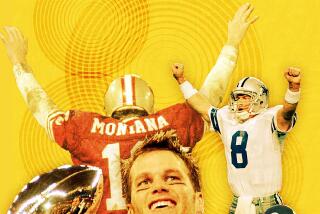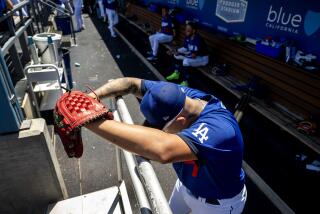No. 19 Gone, 47 Remains
- Share via
Editor’s note: Baltimore Sun columnist John Steadman, a Red Smith Award winner for major contributions to sports journalism and the voice of Baltimore, died Jan. 1, 2001. This column first appeared Dec. 12, 1999.
It’ll soon be 40 years and John Unitas has hardly been challenged, meaning the unapproached record of throwing a touchdown pass in 47 consecutive games. A mark that seems sacrosanct, almost indelible as his exclusive property. Hundreds of quarterbacks have tried to reach the same, magic number but have yet to generate even an idle threat.
Unitas is alone--47 straight games putting a passing touchdown on the scoreboard. An individual distinction. He never set out to create such havoc for rival defenses. His inherent, God-given ability allowed him to do what no other quarterback has done in the 80-year history of the NFL.
The latest to charge Unitas’ achievement is Peyton Manning of the Indianapolis Colts, who has accounted for a scoring pass in 25 consecutive games. He’ll have to nearly double what he has done so far if he’s to pass Unitas. Does Unitas believe his record will be tied or exceeded? “It wouldn’t surprise me,” he said. “Peyton Manning is a logical threat. Teams now play four more games in the schedule. Quarterbacks also throw a lot more, like 40 to 50 passes a game.”
The celebrated ball was taken out of play during the game in Los Angeles and presented to Unitas as a memento. But he has no idea where it is. “I guess some kids got it from me. I always thought a football was to be played with, not looked at.”
Before Manning [whose streak would end at 27 games] got in the throwing contest with Unitas, others made a brief volley but never got there, specifically Dan Marino, who reached 30 and stopped, and Dave Krieg, with 28 successive games before he slammed into the wall. Others took, in the past four decades, their best shots and failed, such as Chris Chandler, Daryle Lamonica, Frank Ryan, Sonny Jurgensen, Warren Moon, Jeff Blake and Dan Fouts.
Yet they never seriously approached Unitas, who four times led the NFL in passing and became an incredible play-caller, beating the clock in pressurized situations and displaying a physical durability that earned the lasting respect of teammates and rivals. The mark of 47 straight games recording a passing touchdown is the attention-getter and provides enduring credibility to his marksmanship.
Some interesting ironies evolve from a study of Unitas’ record, especially what might be called the Los Angeles factor. It was against the Rams at the Coliseum in 1956 that he started the streak; then two years later he surpassed the previous NFL mark of 22 straight games, held by Cecil Isbell. In 1960, again in Los Angeles, what began four years before came to an end. Strangely enough, all three games were losses for the Colts.
A box score of touchdown receptions during the extended string shows Raymond Berry with 38; Lenny Moore, 27; Jim Mutscheller, 24; Alan “the Horse” Ameche, four; L.G. “Long Gone” Dupre and Alex Hawkins, three; and Jerry Richardson, two. The longest pass play was an 82-yard completion to Moore in San Francisco in 1957, and the shortest, for one yard, on two occasions in 1960 went to Hawkins, first in Green Bay and later in Baltimore against the same team.
On the day Unitas moved past the former Packer passer, we interviewed Isbell regarding Unitas by telephone at the Milwaukee Athletic Club. “He’s a fine fellow, a real good person and I’m happy for him,” Isbell said without any hint of regret. Then he paused and added, “Tell him I hope he leaves that short one for me,” meaning a four-inch toss from Isbell to Don Hutson in 1942 that became the shortest scoring pass in NFL history.
The league later decided to remove the “shortest touchdown pass” category from the listings, so Isbell was deprived by the statisticians. Among the witnesses in the immense crowd of 100,202 in Los Angeles when Unitas passed Isbell was the Hall of Fame leader of the Packers, Earl “Curly” Lambeau, who was Isbell’s coach throughout his career in Green Bay.
Asked for a critique of the young Colts quarterback, Lambeau said: “Quite a thing for Unitas in only his third season as a professional quarterback to do something like this. I understand Cecil Isbell said he was happy that as fine a kid as Unitas came along to do the job. I must say I feel the same way.”
During the streak, Unitas hit on 713 passes in 1,336 attempts for 10,827 yards, had 103 touchdown tosses, 62 interceptions and a completion average of 53.4%. His average yards were 230.3 a game. In 1958, after he returned from the casualty list, giving way to backup George Shaw, he was to carry the Colts to their 23-17 championship win over the New York Giants, and Unitas was voted the most valuable player.
The baseball batting record of Joe DiMaggio, who hit safely in 56 straight games for the New York Yankees in 1941, is frequently cited for comparison with Unitas. Or maybe it’s vice versa. Yet the differences between the two sports must be considered. Baseball is played every day, but football kicks off once a week during a shorter season. One is a passive sport; the other involves all-out physical contact. Had DiMaggio missed a game because of illness or injury, his streak would have stopped. In football the rule is different, and rightly so.
A painful injury caused Unitas to miss two games in 1958. The Colts routed the Packers, 56-0, and a defensive back, John Symank, jumped on Unitas after he was on the ground, puncturing a lung and damaging his ribs. Doctors refused to let him play for two weeks. Then, fitted with a protective jacket under his jersey, Unitas returned to beat the Rams, 34-7, while throwing touchdown shots to Moore, for 58 yards, on his first pass attempt and a 12-yarder to Mutscheller.
There were times during the streak when he threw multiple touchdown passes, on seven occasions as many as four in a game. Perhaps the closest he came to having the streak end was in Game 40 at Green Bay, a 35-21 loss to the Packers.
He didn’t connect until 70 seconds were left, pitching to Hawkins for the final score.
While Unitas was putting up his amazing total of 47 in a row, there was little attention brought to what he was doing. The country had become aware of his rich natural ability, but there was only casual mention of how, game after game, he was firing touchdown passes.
After he kept the skein alive in Green Bay, he was asked how important it was to maintain the touchdown consistency, adding to the count each Sunday. “Records don’t mean a thing to me,” Unitas said. “Nothing is as important as winning. You go into a game to win as a team and not set records. I imagine if I was record-hungry, the thing wouldn’t have been extended this far. It makes no difference to me when it stops.”
Now the question: Will “47” be duplicated or surpassed? It’s impossible to say it’s never going to happen, because records, regardless of who sets them, have a way of being surpassed. John Unitas’ football immortality, in truth, isn’t based on numbers, regardless of what happens to “47” and those amazing touchdown totals he put together.
*
(BEGIN TEXT OF INFOBOX)
In the Zone
Most consecutive NFL games with a touchdown pass:
Johnny Unitas, Baltimore, 1956-60...47
Dan Marino, Miami, 1985-87...30
Dave Krieg, Seattle, 1983-85...28
Most seasons, leading league in touchdown passes:
4--Johnny Unitas, Len Dawson,
Steve Young
3--Arnie Herber, Sid Luckman,
Y.A. Tittle, Dan Marino, Brett Favre
Most games, four or more touchdown passes:
Dan Marino...21
Johnny Unitas...17
Brett Favre...14
More to Read
Go beyond the scoreboard
Get the latest on L.A.'s teams in the daily Sports Report newsletter.
You may occasionally receive promotional content from the Los Angeles Times.










